Inside Block Six
The prison wing that holds 2,000 Taliban

Pul-e-charkhi Prison
Kabul

Warning: This article contains descriptions some readers may find upsetting.
Pul-e-Charkhi prison, on the outskirts of Afghanistan's capital Kabul, is surrounded by colossal grey stone walls topped with barbed wire, and guarded by numerous watch towers and huge steel gates. Of the 10,000 inmates, about one fifth are Taliban - Afghanistan's hardline Islamist insurgent group.
Taliban inmate Mawlawi Fazel Bari says he wasn't born a fighter, but after five years in prison, he says he’s never felt more ready to die.
“I have become so frustrated. I never thought I would carry out a suicide motor-bomb, but now, by god I swear I will.”
For the time being, Bari will remain incarcerated at the top-security jail. But the prison is one of a number across the country that has been releasing Taliban prisoners in unprecedented numbers, as part of a goodwill gesture by a government locked out of peace talks.
The Taliban’s long-term aim is to restore the Islamic Emirate in Afghanistan - its system of governance while it was in power between 1996 and 2001 - which introduced Sharia, or Islamic law, and a harsh regime, banning women from public life and introducing punishments including stonings and amputations. It is not clear how any future Taliban regime would operate.
Hundreds of thousands of people have died in Afghanistan since US-led forces toppled the Taliban government in 2001, including tens of thousands of civilians.
The Taliban prisoners were open during our visit about their motivations and grievances, but reluctant to talk about their specific activities. But we do know that Mawlawi Fazel Bari joined the Taliban 15 years ago and became a commander for the group in Helmand province, fighting Afghan and international forces in that region.
Bari’s tiny prison cell is packed with Taliban members. There are queues out into the corridor - some men hunkering down in the doorways, others looking down from three-tier-high bunk beds. One elderly inmate sits on the floor, silently chanting over long prayer beads.
The floor is a sea of red carpet and cushions, and across all four walls there is a mosaic of posters depicting images of the Islamic holy sites of Mecca and Medina, as well as generic idyllic scenes - bouquets of flowers, waterfalls, even ice cream cones.
The cell has been decorated to invoke a vision of paradise, reflecting the inmates’ fundamental belief that if they are killed in action they will go straight to heaven.
Next to the walls are improvised shelves piled high with heavy books on Islamic literature and the Koran.
Bari begins to preach and all eyes turn to him. He is also a former senior scholar, and as such his fellow inmates hold him in high regard.
“I tell you this,” he says, “as long as there is one foreign soldier in Afghanistan, peace is not possible.”
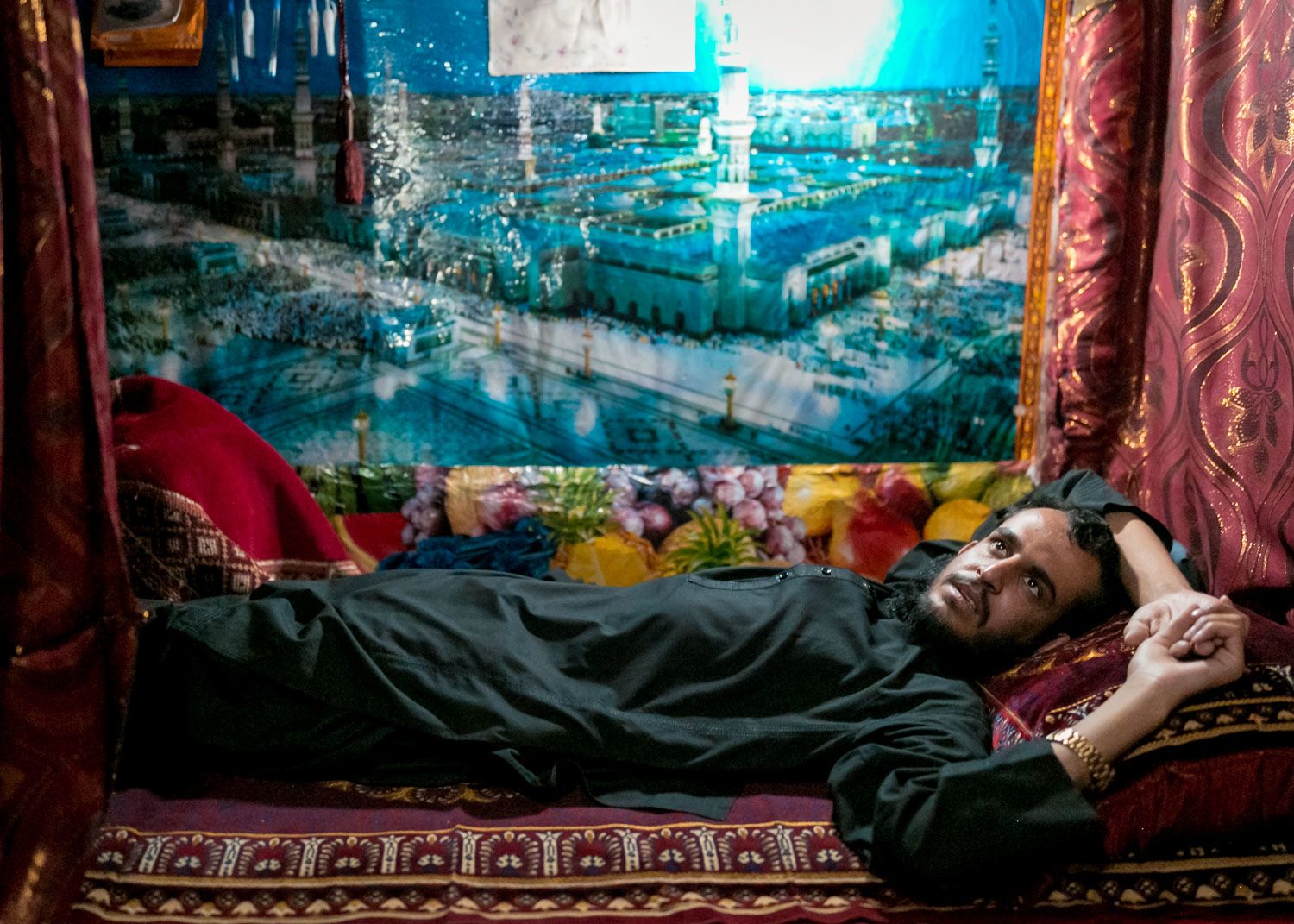
The Taliban in Afghanistan were accused of providing a sanctuary to Osama Bin Laden and the al-Qaeda movement - blamed for the co-ordinated terror attacks on the US in September 2001. After 19 years of war between the Taliban and the US-led forces, the conflict in Afghanistan is now the longest in US history.
President Donald Trump seemed close to a deal with the Taliban in September. But he abruptly called off peace talks after the militants admitted responsibility for a bomb blast in Kabul that killed 12, including a US soldier.
The US says it still has at least 13,000 troops in the country. As part of a draft deal with the Taliban - currently off the table following the break down of talks - it promised to reduce them to 8,600 within the first five months of it being signed.
Mr Trump pledged during his 2016 presidential campaign that he would end the US war in Afghanistan. But many critics believe without involving the Afghan government - so far not included in the peace talks - such a withdrawal could leave the country in chaos.

Warning: This article contains descriptions some readers may find upsetting.
Pul-e-Charkhi prison, on the outskirts of Afghanistan's capital Kabul, is surrounded by colossal grey stone walls topped with barbed wire, and guarded by numerous watch towers and huge steel gates. Of the 10,000 inmates, about one fifth are Taliban - Afghanistan's hardline Islamist insurgent group.

Taliban inmate Mawlawi Fazel Bari says he wasn't born a fighter, but after five years in prison, he says he’s never felt more ready to die.
“I have become so frustrated. I never thought I would carry out a suicide motor-bomb, but now, by god I swear I will.”
For the time being, Bari will remain incarcerated at the top-security jail. But the prison is one of a number across the country that has been releasing Taliban prisoners in unprecedented numbers, as part of a goodwill gesture by a government locked out of peace talks.
The Taliban’s long-term aim is to restore the Islamic Emirate in Afghanistan - its system of governance while it was in power between 1996 and 2001 - which introduced Sharia, or Islamic law, and a harsh regime, banning women from public life and introducing punishments including stonings and amputations. It is not clear how any future Taliban regime would operate.
Hundreds of thousands of people have died in Afghanistan since US-led forces toppled the Taliban government in 2001, including tens of thousands of civilians.
The Taliban prisoners were open during our visit about their motivations and grievances, but reluctant to talk about their specific activities. But we do know that Mawlawi Fazel Bari joined the Taliban 15 years ago and became a commander for the group in Helmand province, fighting Afghan and international forces in that region.
Bari’s tiny prison cell is packed with members of the Taliban. There are queues out into the corridor - some men hunkering down in the doorways, others looking down from three-tier-high bunk beds. One elderly inmate sits on the floor, silently chanting over long prayer beads.

The floor is a sea of red carpet and cushions, and across all four walls there is a mosaic of posters depicting images of the Islamic holy sites of Mecca and Medina, as well as generic idyllic scenes - bouquets of flowers, waterfalls, even ice cream cones.
The cell has been decorated to invoke a vision of paradise, reflecting the inmates’ fundamental beliefs that if they are killed in action they will go straight to heaven.
Next to the walls are improvised shelves piled high with heavy books on Islamic literature and the Koran.
Bari begins to preach and all eyes turn to him. He is also a former senior scholar, and as such his fellow inmates hold him in high regard.
“I tell you this,” he says, “so long as there is one foreign soldier in Afghanistan, peace is not possible.”

The Taliban in Afghanistan were accused of providing a sanctuary to Osama Bin Laden and the al-Qaeda movement - blamed for the co-ordinated terror attacks on the US in September 2001. After 19 years of war between the Taliban and the US-led forces, the conflict in Afghanistan is now the longest in US history.
US President Donald Trump seemed close to a deal with the Taliban in September. But he abruptly called off peace talks after the militants admitted responsibility for a bomb blast in Kabul that killed 12, including a US soldier.
The US says it still has at least 13,000 troops in the country. As part of the draft deal with the Taliban - currently off the table following the talks break down - it promised to reduce them to 8,600 within the first five months of it being signed.
Trump pledged during his 2016 presidential campaign that he would end the US war in Afghanistan.
But many critics believe that without involving the Afghan government - so far not included in the peace talks - such a withdrawal could leave the country in chaos.
Walking into Block Six feels like entering Taliban territory. The long corridors are full of Taliban inmates moving freely around - shaving, showering, cooking.
Bari’s cellmates hail from all walks of Afghan life. They are former teachers, farmers, traders and drivers who have been tried and convicted of also belonging to the Taliban - found guilty of a variety of roles, from collecting taxes, to patrolling as a foot soldier, to planting bombs.
Elders such as Bari co-ordinate the daily prison schedule - leading inmates through hours of worship and Islamic studies. During meal times and the prisoners’ designated hour outside, politics dominates the conversation.
Many say that they were initially motivated to join the Taliban out of revenge, often in retaliation against airstrikes.
“When the American forces carried out an airstrike over my village [15 years ago] my neighbour and his two wives died, but their youngest, a boy called Rahmatullah, survived,” says Bari.
“I adopted the boy and helped him to study. But every time he heard the sound of helicopters overhead, he would run to me screaming: ‘They have come to kill me.’”
He says he was motivated to join the war after he saw “too many mosques being destroyed, and women and children killed”.
Another Taliban elder in the prison, Mullah Sultan, also says he wanted to stand against the “atrocities” he witnessed. “As an Afghan I saw it as my right to raise my voice and say I don’t accept these invaders,” he says.

Over the past decade the gradual withdrawal of foreign troops by the US-led coalition has been offset by an increase in airstrikes, which are frequently inaccurate, incurring substantial civilian losses.
In the first half of 2019, the UN says that more civilians were killed by Afghan and US-led forces than by Taliban forces.
However, insurgent forces including the Taliban have been responsible for most civilian deaths over the past decade, according to the UN.
If the Taliban inmates say developments on the battlefield are motivating young men to join the Taliban, they also appear to be fuelling their grievances while in prison.
Leaders like Bari are believed to receive sermons from their superiors, and even from Sheikh Hibatullah Akhundzada, the Taliban’s supreme leader, and then pass down their teachings directly to the prisoners.
News on the peace talks, when they were going on, was also eagerly shared.
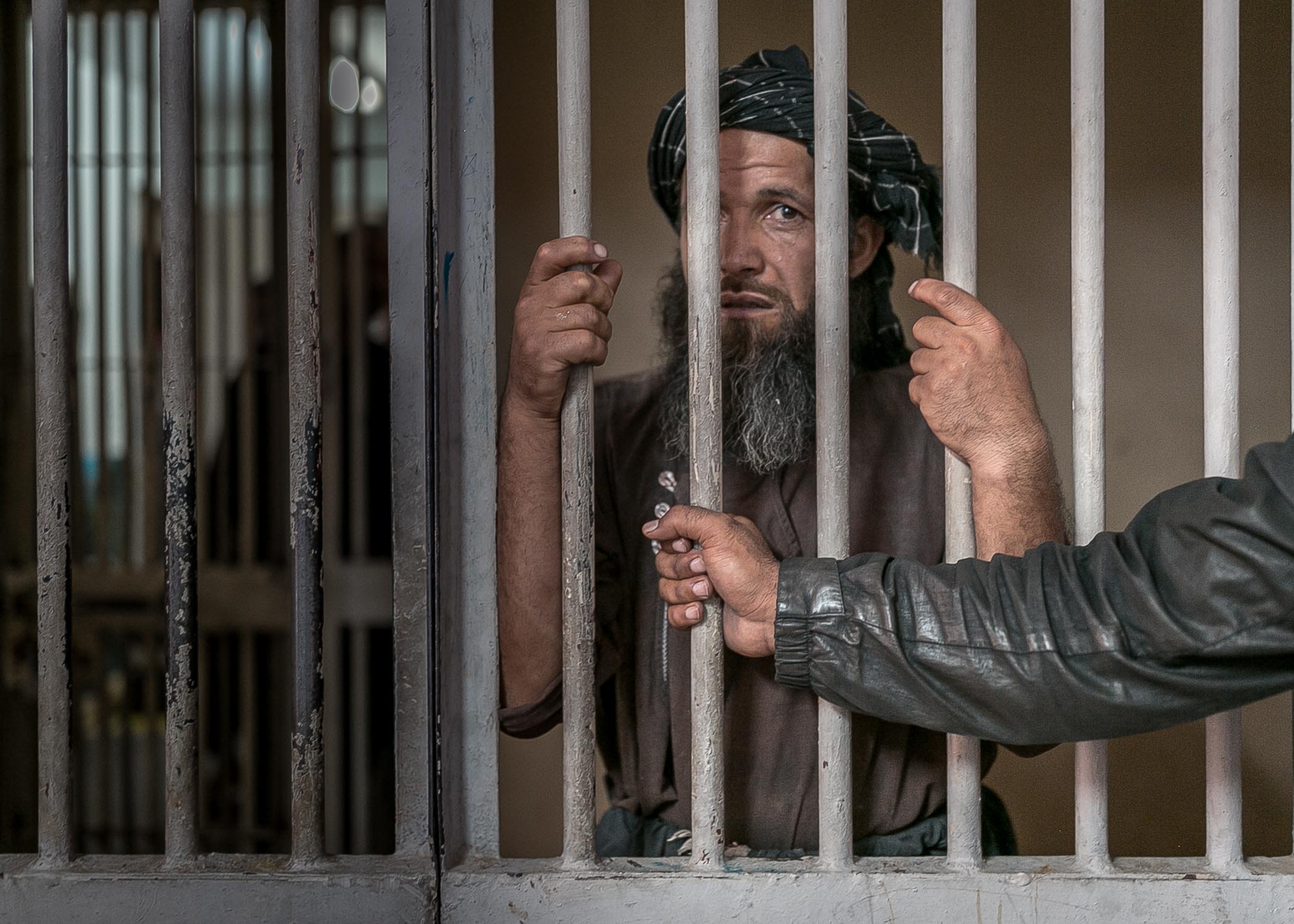
“We know the foreigners are tired,” says Mullah Sultan.
“We believe they are on their knees and will soon be on their way. We Afghans will live together under the umbrella of Sharia [Islamic law] and an Islamic system.”


Walking into Block Six feels like entering Taliban territory. The long corridors are full of Taliban inmates moving freely around - shaving, showering, cooking.
Bari’s cellmates hail from all walks of Afghan life. They are former teachers, farmers, traders and drivers who have been tried and convicted of belonging to the Taliban - found guilty of a variety of roles, from collecting taxes, to patrolling as a foot soldier, to planting bombs.
Elders such as Bari co-ordinate the daily prison schedule - leading inmates through hours of worship and Islamic studies.
During meal times and the prisoners’ designated hour outside, politics dominates the conversation.
Many say that they were initially motivated to join the Taliban out of revenge, often in retaliation against airstrikes.
“When the American forces carried out an airstrike over my village [15 years ago] my neighbour and his two wives died, but their youngest, a boy called Rahmatullah, survived,” says Bari.
“I adopted the boy and helped him to study. But every time he heard the sound of helicopters overhead, he would run to me screaming: ‘They have come to kill me.’”
He says he was motivated to join the war after he saw “too many mosques being destroyed, and women and children killed”.
Another Taliban elder in the prison, Mullah Sultan, also says he wanted to stand against the “atrocities” he witnessed. “As an Afghan I saw it as my right to raise my voice and say I don’t accept these invaders,” he says.
Over the past decade the gradual withdrawal of foreign troops by the US-led coalition has been offset by an increase in airstrikes, which are frequently inaccurate, incurring substantial civilian losses.
In the first half of 2019, the UN says that more civilians were killed by Afghan and US-led forces than by Taliban forces.
However insurgent forces including the Taliban have been responsible for most civilian deaths over the past decade, according to the UN.
If the Taliban inmates say developments on the battlefield are motivating young men to join the Taliban, they also appear to be fuelling their grievances while in prison.
Leaders like Bari are believed to receive sermons from their superiors, and even from Sheikh Hibatullah Akhundzada, the Taliban’s supreme leader, and then pass down their teachings directly to the prisoners.
News on the peace talks, when they were going on, was also eagerly shared.
“We know the foreigners are tired,” says Mullah Sultan.
“We believe they are on their knees and will soon be on their way. We Afghans will live together under the umbrella of Sharia [Islamic law] and an Islamic system.”

Taliban elders Mullah Sultan (L) and Mawlawi Fazel Bari (R)
Taliban elders Mullah Sultan (L) and Mawlawi Fazel Bari (R)
The Taliban inmates seem to enjoy greater privileges than other prisoners, such as controlling their own timetable, running the prison’s madrassa [religious school], as well as better access to health care and legal aid.
And their unity and clear chains of command appear to have given them more influence within the prison. As a result they sometimes represent the entire population of Pul-e-Charkhi to lobby for better conditions. The guards recognise that they present a united front, who, as another Taliban prison elder, Mawlawi Mamur, tells us, “will die for each other’s rights”.
The guards say the relationship between themselves and the Taliban prisoners is collaborative.
“The sense of co-operation is very strong between us and the Taliban inmate leaders,” says 28-year-old guard Rahmudin, the commander of Block Six.
“There are up to 2,000 inmates at any one time, so we need their co-operation and to solve their problems.”
But regular strikes by Taliban inmates in Pul-e-Charkhi over their conditions suggest the relationship is not always mutual.
The inmates told the BBC that they regularly hold hunger strikes by sewing their lips together or piercing bicycle spokes through their mouths to protest against what they claim to be poor conditions at the prison such as inadequate medical attention, slow legal processing and the mistreatment of prisoners by guards.
There are also reports of Taliban prisoners attacking the prison guards, even sometimes taking control of part of the prison.
The BBC contacted the Ministry of Interior Affairs to verify these reports but did not receive a response. However every few months it receives photos of the strikes, and calls and messages pleading for help.
Earlier this year, clashes between prisoners and guards resulted in the deaths of four inmates and the injury of 33 other people, including 20 police officers. Unconfirmed reports said that the inmates had been demonstrating about a lack of health facilities, but a spokesperson for the Ministry of Interior Affairs told the BBC at the time that the clashes followed a check for drugs and was instigated by drug dealers in the prison.
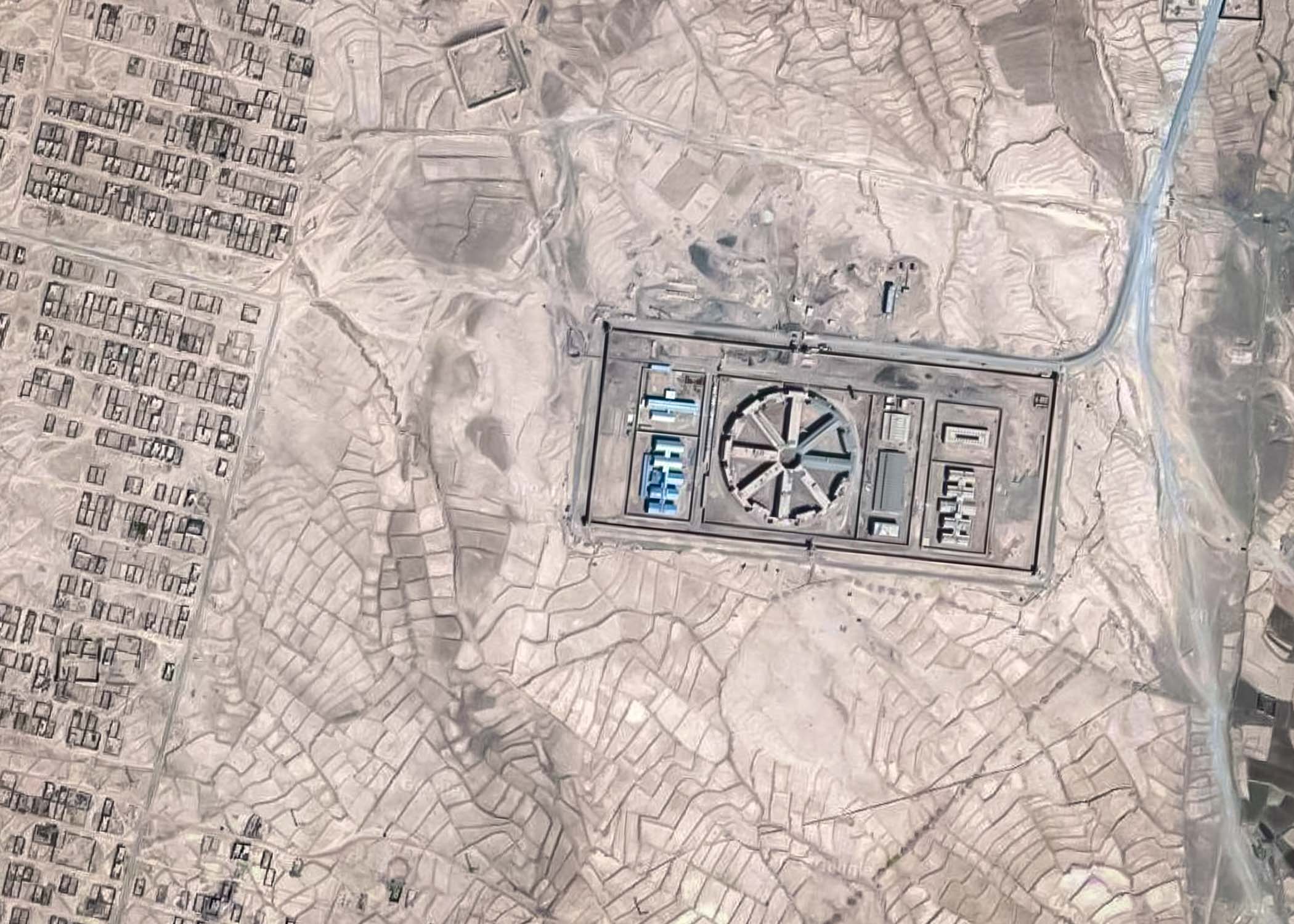
Pul-e-Charkhi prison from above
Pul-e-Charkhi prison from above
Living for years in such volatile conditions serves to harden the attitudes of these prisoners.
And some of them have been, or are due to be, released in unprecedented numbers. Afghan President Ashraf Ghani said in June that some 887 Taliban prisoners would be freed from Pul-e-Charkhi and other prisons.
It is traditional for the president to announce dozens of prisoner releases to celebrate the Islamic festival of Eid, but this was an unprecedented gesture which critics have interpreted as a show of power by a government excluded from the US-Taliban peace talks.
The Taliban refused to hold direct negotiations with the government as they do not recognise its legitimacy.
Bari is due to serve his sentence for another two years, although he is adamant that when he is freed he will continue his jihad, or holy war.
“When I am released from here I will rejoin my ranks. Before I was 20% [committed], but now I am 100% committed to carrying on my jihad and defending my country.”
One of those who has been released under the presidential pardons is his friend and former cellmate Qari Sayed Muhammed, now home in Taliban territory.



Taliban elders Mullah Sultan (L) and Fazel Bari (R)
Taliban elders Mullah Sultan (L) and Fazel Bari (R)
The Taliban inmates seem to enjoy greater privileges than other prisoners, such as controlling their own timetable, running the prison’s madrassa [religious school], as well as better access to health care and legal aid.
And their unity and clear chains of command appear to have given them more influence within the prison. As a result they sometimes represent the entire population of Pul-e-Charkhi to lobby for better conditions. The guards recognise that they present a united front, who, as another Taliban prison elder, Mawlawi Mamur, tells us, “will die for each other’s rights”.
The guards say the relationship between themselves and the Taliban prisoners is collaborative.
“The sense of co-operation is very strong between us and the Taliban inmate leaders,” says 28-year-old guard Rahmudin, the commander of Block Six.
“There are up to 2,000 inmates at any one time, so we need their co-operation and to solve their problems.”
But regular strikes by Taliban inmates in Pul-e-Charkhi over their conditions suggest the relationship is not always mutual.
The inmates told the BBC that they regularly hold hunger strikes by sewing their lips together or piercing bicycle spokes through their mouths to protest against what they claim to be poor conditions at the prison such as inadequate medical attention, slow legal processing and the mistreatment of prisoners by guards.
There are also reports of Taliban prisoners attacking the prison guards, even sometimes taking control of part of the prison.
The BBC contacted the Ministry of Interior Affairs to verify these reports but did not receive a response. However every few months it receives photos of the strikes, and calls and messages pleading for help.
Earlier this year, clashes between prisoners and guards resulted in the deaths of four inmates and the injury of 33 other people, including 20 police officers. Unconfirmed reports said that the inmates had been demonstrating about a lack of health facilities, but a spokesperson for the Ministry of Interior Affairs told the BBC at the time that the clashes followed a check for drugs and was instigated by drug dealers in the prison.
Living for years in such volatile conditions all serve to harden the attitudes of these prisoners.
And some of them have been, or are due to be, released in unprecedented numbers. Afghan President Ashraf Ghani said in June that some 887 Taliban prisoners would be freed from Pul-e-Charkhi and other prisons across the country.
It is traditional for the president to announce dozens of prisoner releases to celebrate the Islamic festival of Eid, but this was an unprecedented gesture which critics have interpreted as a show of power by a government excluded from the US-Taliban peace talks.

Pul-e-Charkhi prison from above
Pul-e-Charkhi prison from above
The Taliban refused to hold direct negotiations with the government as they do not recognise its legitimacy.
Bari is due to serve his sentence for another two years, although he is adamant that when he is freed he will continue his jihad, or holy war.
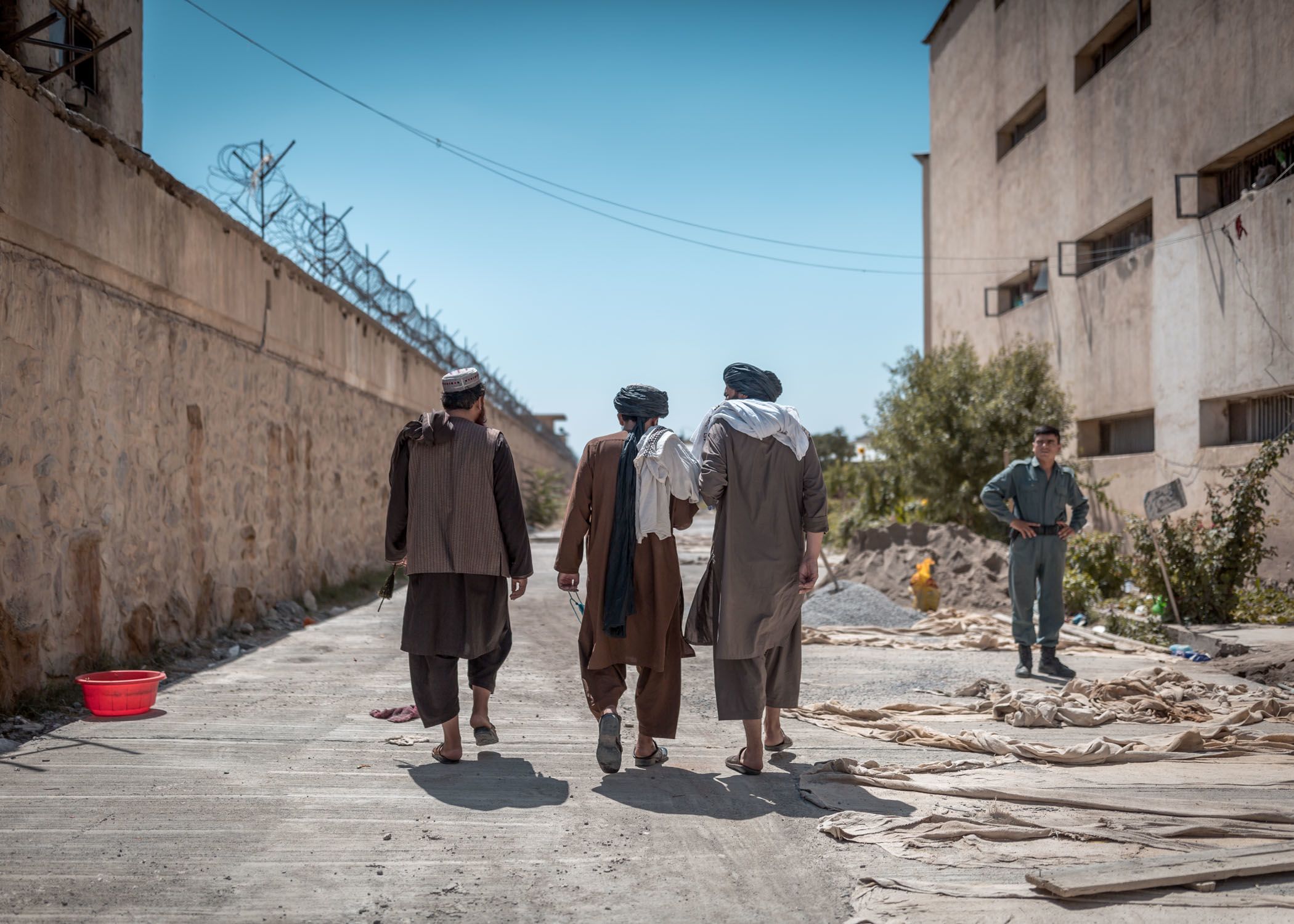
“When I am released from here I will rejoin my ranks. Before I was 20% [committed], but now I am 100% committed to carrying on my jihad and defending my country.”
One of those who has been released under the presidential pardons is his friend and former cellmate Qari Sayed Muhammed, now home in Taliban territory.
Taliban territory
Balkh
North Afghanistan
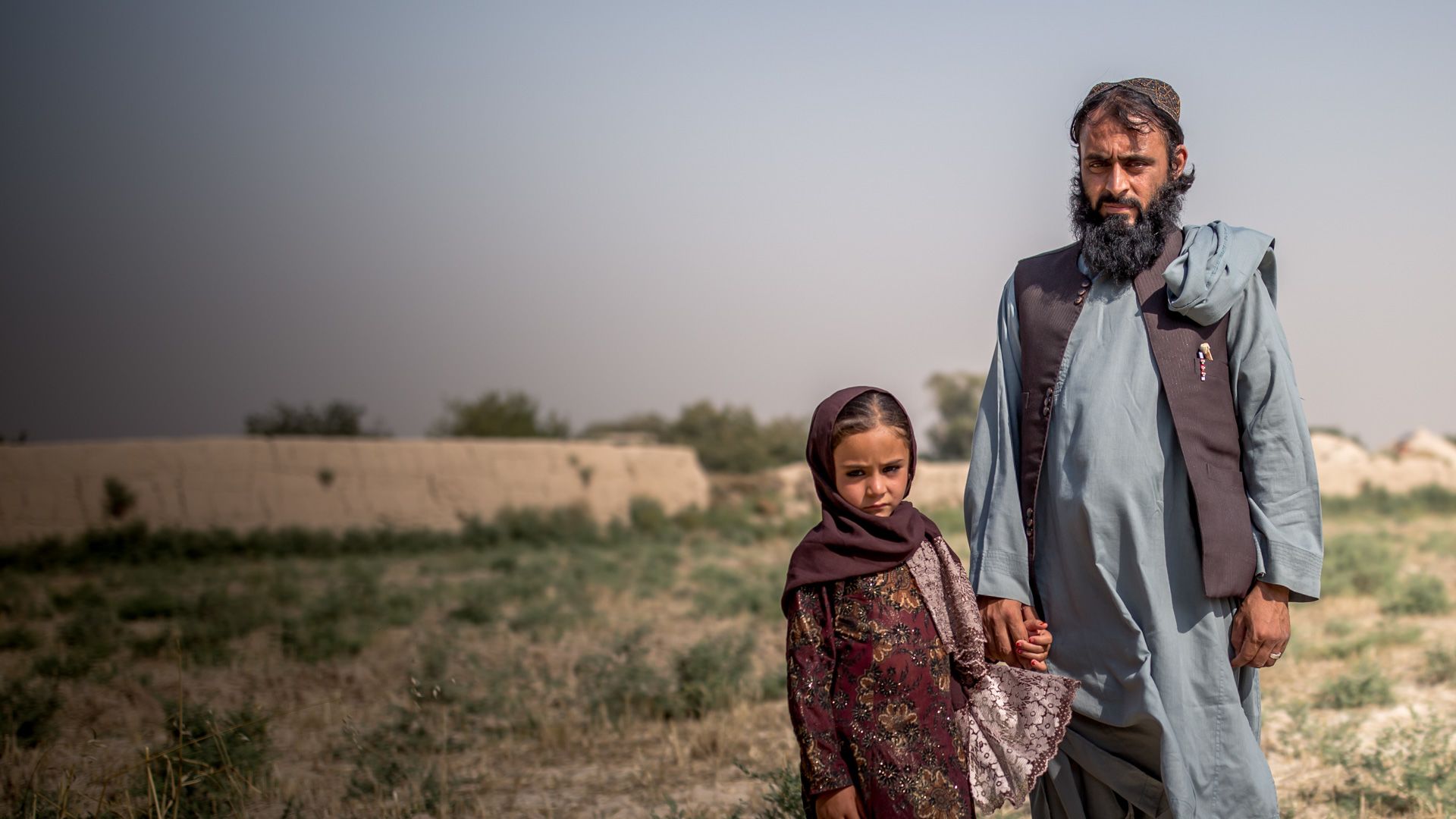
Qari Sayed Muhammed, 32, lives in Balkh province, northern Afghanistan - deep in Taliban territory. He spent six years in Pul-e-Charkhi prison.
As the only remaining male in his family - his father and two brothers were killed while he was in jail - he says for now he must stay at home to run the family farm.
He believes that of those prisoners recently freed, he is one of only a handful who are still alive.
“I believe 95% of those recently released have rejoined the Taliban and a lot of them have already died,” he says.
While his former fellow inmate Bari was motivated by revenge, Muhammed says he joined the Taliban - at 18 years old, along with 15 of his friends - as a way of escaping police harassment.
“Harassment is a part of village life. Often, if someone told the police lies about us, they would harass us. So we thought if they are going to arrest us anyway, we might as well take our fate into our own hands.”
Violence and corruption within Afghan police forces has been acknowledged as a widespread problem across the country by several human rights organisations.
There are, however, a multitude of reasons why a young Afghan man might join the Taliban - a reaction to indiscriminate shooting and shelling; unemployment; a desire for war booty such as weapons, vehicles and ammunition which they can later sell; and even peer pressure.
One of Muhammed’s first jobs for the Taliban was collecting its mandatory taxes. Riding out on motorbikes in a unit of six men or fewer, he would demand money from every opium farm - legal in Taliban territory - from across four districts.
As a foot soldier, Muhammed says there was no official salary, but all his expenses were covered, from ammunition and fuel to mobile credit.
He says it was some three years later - with the war intensifying across the country - that his motivation shifted, and he embraced the Taliban’s jihad or holy war against all foreign troops.
“I was 21 when I slung a gun over my shoulder. I remember thinking I was entering into a battle against the infidels, for the defence of Muslims. This thought has stayed with me and will until the end.”

Following the ideology of a jihadi, he says whenever he feared for his life he would try to counter concerns for his family with the thought that he would be fulfilling his religious duty if he were to be killed.
He describes a mission during which his unit was ambushed in a village on flat ground, and he was being fired on with a Russian machine gun.
“It’s during these moments that your brain starts working really fast. You begin thinking: 'What will happen to my household? My children? My wife?' That's when the devil tries to distract you, tempt you into thinking about your family. But I tried to focus all my attention on the fact that I was serving Allah.”
Muhammed was captured by the Afghan intelligence services in 2013 and sent to Pul-e-Charki.
He believes, of the 15 young men with whom he first left his village to join the Taliban, only two are still alive.

Qari Sayed Muhammed, 32 years old, lives in Balkh province, northern Afghanistan - deep in Taliban territory after six years in Pul-e-Charkhi prison.
As the only remaining male in his family - his father and two brothers were killed while he was in jail - he says for now he must stay at home to run the family farm.
He believes that of those prisoners recently freed, he is one of only a handful who are still alive.
“I believe 95% of those recently released have rejoined the Taliban and a lot of them have already died,” he says.
While his former fellow inmate Bari was motivated by revenge, Muhammed says he initially joined the Taliban - at 18 years old, along with 15 of his friends - as a way of escaping police harassment.
“Harassment is a part of village life. Often, if someone told the police lies about us, they harass us. So we thought if they are going to arrest us anyway, we might as well take our fate into our own hands.”
Violence and corruption within Afghan police forces has been acknowledged as a widespread problem across the country by several human rights organisations.
There are however a multitude of reasons why a young Afghan man might join the Taliban - a reaction to indiscriminate shooting and shelling; unemployment; a desire for war booty such as weapons, vehicles and ammunition, which they can later sell; and even peer pressure.
One of Muhammed’s first jobs for the Taliban was collecting its mandatory taxes. Riding out on motorbikes in a unit of six men or fewer, he would demand money from every opium farm - legal in Taliban territory - from across four districts.
As a foot soldier, Muhammed says there was no official salary, but all his expenses were covered, from ammunition and fuel to mobile credit.
He says it was some three years later - with the war intensifying across the country - that his motivation shifted, and he embraced the Taliban’s jihad or holy war against all foreign troops.
“I was 21 when I slung a gun over my shoulder. I remember thinking I was entering into a battle against the infidels, for the defence of Muslims. This thought has stayed with me and will until the end.”
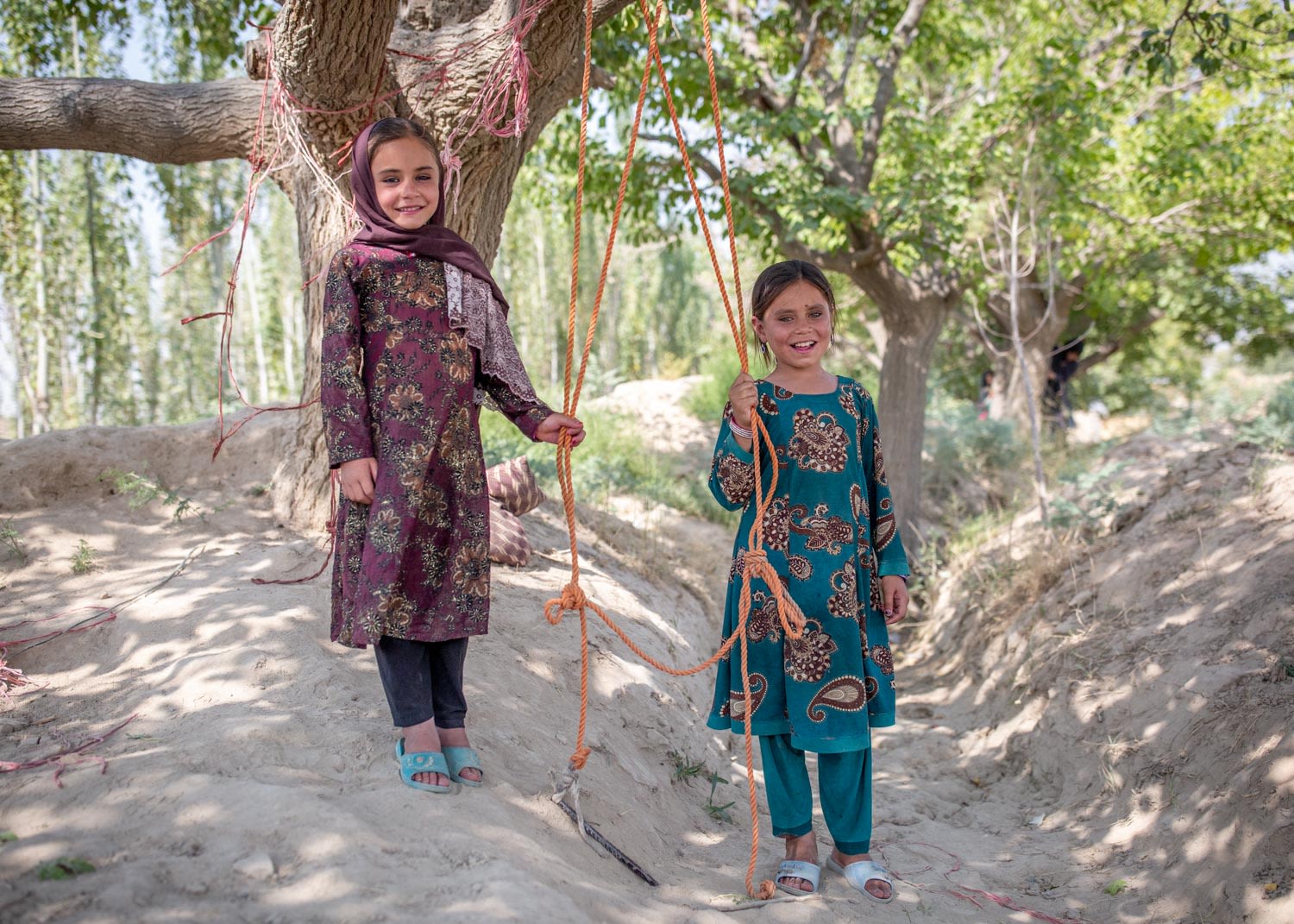
Following the ideology of a jihadi, he says whenever he feared for his life he would try to counter concerns for his family with the thought that he would be fulfilling his religious duty if he were to be killed.
He describes a mission during which his unit was ambushed in a village on flat ground, and he was being fired on with a Russian machine gun.
“It’s during these moments that your brain starts working really fast. You begin thinking: 'What will happen to my household? My children? My wife?' That's when the devil tries to distract you, tempt you into thinking about your family. But I tried to focus all my attention on the fact that I was serving Allah.”
Muhammed was captured by the Afghan intelligence services in 2013 and sent to Pul-e-Charki.
He believes, of the 15 young men with whom he first left his village to join the Taliban, only two are still alive.
Government Territory
Kunar
East Afghanistan


After decades of war, Afghanistan has become a patchwork of different territories. Only 20%-30% of the country is controlled by the government, and the Taliban now control or contest more territory in Afghanistan than at any point since 2001, according to research by the Foundation for Defense of Democracies' Long War Journal in October.
Opportunities for young men are slim, and many feel the obvious choice is to join the fighting. But often where they are born can determine who they fight for.
When Nematullah was 24 years old and living in Kunar Province, eastern Afghanistan, he decided to devote his life to the Afghan National Army.
His story reflects the potential for bureaucratic chaos in a nation in turmoil.

Nematullah on his farm
Nematullah on his farm
After three years of travelling and fighting all over Afghanistan, Nematullah and his unit were sent to guard an isolated outpost in the mountainous region of Chinartu, Uruzgan province.
Small cells of Taliban would frequently attack the outpost, and Nematullah and his fellow soldiers got used to the routine of exchanging a few rounds until their adversaries were driven back.
But one night, the Taliban attacked in huge numbers. Nematullah’s unit was overwhelmed.
“The fighting went on forever and as dawn broke we ran out of ammo,” he says.
“They handcuffed and blindfolded us. Then beat us with the end of their guns. They called us infidels, slaves of the non-Muslims.
“As they led us away, I was counting every step towards death.”
Only days later, Nematullah’s family was contacted by the Afghan Ministry of Defence to tell them their son had been killed and they were to come and collect their son’s body from the morgue.
Within hours of receiving the closed coffin, the family held a funeral for their lost son. They were told the casket had been sealed shut because his body was unrecognisable.
For 18 months, his family, including his new fiancé, continued to make daily visits to his grave, bringing fresh flowers and offering their prayers.

After decades of war, Afghanistan has become a patchwork of different territories. Only 20%-30% of the country is controlled by the government, and the Taliban now control or contest more territory in Afghanistan than at any point since 2001, according to research by the Foundation for Defense of Democracies' Long War Journal in October.
Opportunities for young men are slim, and many feel the obvious choice is to join the fighting. But often where a man is born can determine for whom they fight.
When Nematullah was 24 years old and living in Kunar Province, eastern Afghanistan, he decided to devote his life to the Afghan National Army.
His story reflects the potential for bureaucratic chaos in a nation in turmoil.

After three years of travelling and fighting all over Afghanistan, Nematullah and his unit were sent to guard an isolated outpost in the mountainous region of Chinartu, Uruzgan province.
Small cells of Taliban would frequently attack the outpost, and Nematullah and his fellow soldiers got used to the routine of exchanging a few rounds until their adversaries were driven back.
But one night Taliban attacked in huge numbers. Nematullah’s unit was overwhelmed.
“The fighting went on forever and as dawn broke we ran out of ammo,” he says.
“They handcuffed and blindfolded us. Then beat us with the end of their guns. They called us infidels, slaves of the non-Muslims.
“As they led us away, I was counting every step towards death.”

Only days later, Nematullah’s family was contacted by the ministry of defence to tell them their son had been killed and they were to come and collect his body from the morgue.
Within hours of receiving the closed coffin, the family held a funeral for their lost son. They were told the casket had been sealed shut because his body was unrecognisable.
For 18 months, his family, including his new fiancé, continued to make daily visits to his grave, bringing fresh flowers and offering their prayers.

Back in Uruzgan, Nematullah had been taken deep into the mountains, to a huge winding network of caves. Along with 54 other captives, he was made to dig his own cell from out of the rock face.
For a year and a half, he shared his self-built cell with 11 other men, all Afghan army and police recruits. Their hands and feet were chained for almost 24 hours a day.
Nematullah remembers the Taliban giving them so little bread, the monotony of captivity was almost as bad as the hunger. Until finally, one evening around midnight, Nematullah and his cell mates were awoken by the deafening sound of explosions all around them.
They were positioned directly beneath an airstrike, and the destruction it created allowed them to break free.
The first thing he did was to ring his father.
“‘It's me, Nemat,’ I said. To which my father replied, ‘Which Nemat?’ ‘Your son,’ I said. But he still didn't believe me.’”
Only several selfies later, did his father finally believe that his son was alive.

Arriving home to Kunar on the first day of Ramadan, word had already spread of his return. A party was under way, but before rejoining his family, Nematullah had one important visit to make - to the graveyard to offer a prayer for his fellow fallen soldier.
Since his return, Nematullah and recently married wife have not stopped their daily visits to the grave of the unidentified soldier. They say he is now their brother and their responsibility.
Such cases of mistaken identity are not unique - the BBC has learned of several such incidents, of kidnapped Afghan soldiers returning home to find their family have buried the wrong body after being given a sealed coffin by the government. The Afghan government has declined to comment.
Despite the trauma of being held captive, Nematullah says he must return to the battlefield and continue to serve his country.

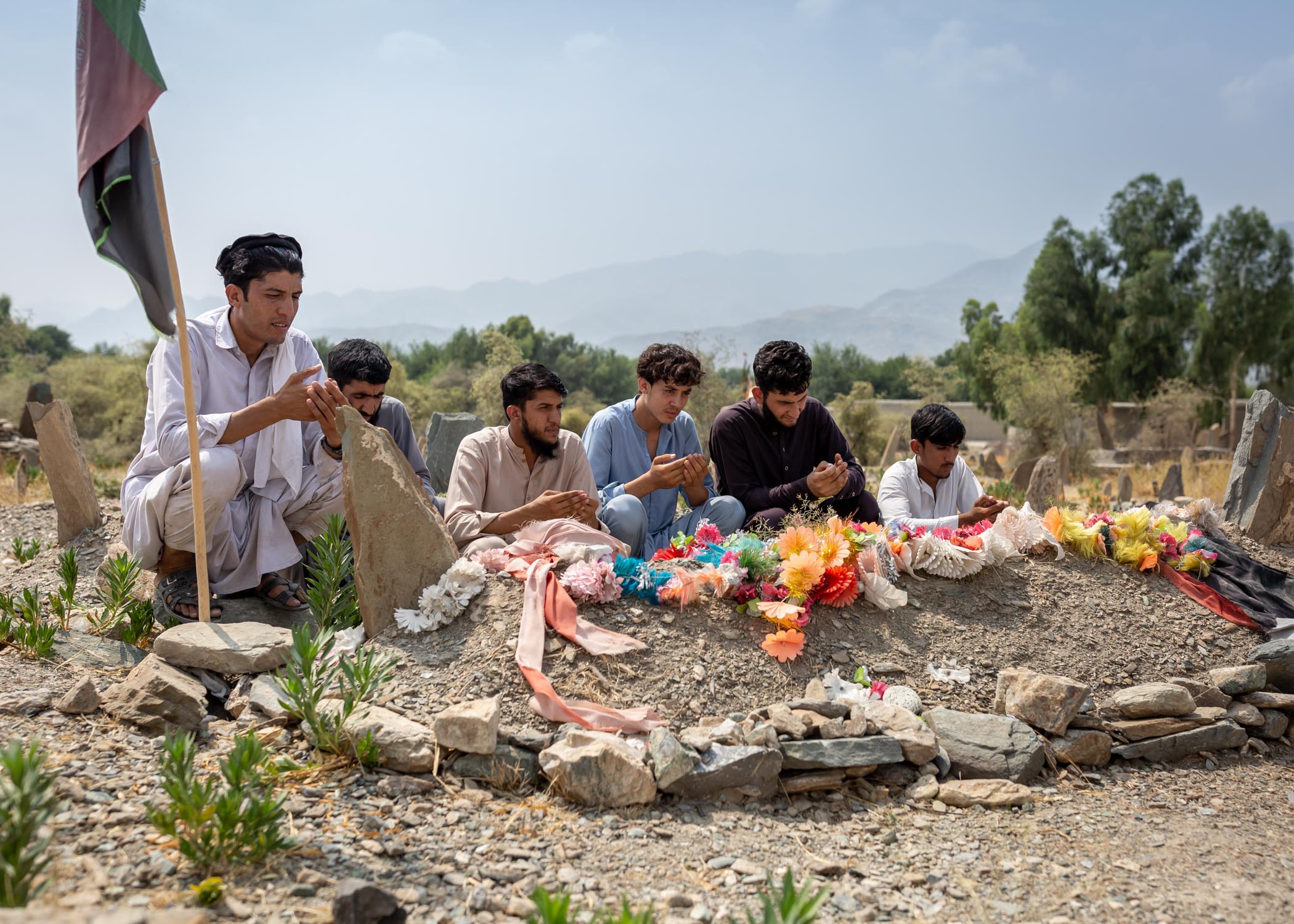
Back in Uruzgan, Nematullah had been taken deep into the mountains, to a huge winding network of caves. Along with 54 other captives, he was made to dig his own cell from out of the rock face.
For a year and a half, he shared his self-built cell with 11 other men, all Afghan army and police recruits. Their hands and feet were chained for almost 24 hours a day.
Nematullah remembers the Taliban giving them so little bread, the monotony of captivity was almost as bad as the hunger. Until finally, one evening around midnight, Nematullah and his cell mates were awoken by the deafening sound of explosions all around them.
They were positioned directly beneath an airstrike, and the destruction it created allowed them to break free.
The first thing he did was to ring his father.
“‘It's me, Nemat,’ I said. To which my father replied, ‘Which Nemat?’ ‘Your son,’ I said. But he still didn't believe me.’”
Only several selfies later, did his father finally believe that his son was alive.

Arriving home to Kunar on the first day of Ramadan, word had already spread of his return. A party was under way, but before rejoining his family, Nematullah had one important visit to make - to the graveyard to offer a prayer for his fellow fallen soldier.
Since his return, Nematullah and recently married wife have not stopped their daily visits to the grave of the unidentified soldier. They say he is now their brother and their responsibility.
Such cases of mistaken identity are not unique - the BBC has learned of several such incidents, of kidnapped Afghan soldiers returning home to find their family have buried the wrong body after being given a sealed coffin by the government. The Afghan government has declined to comment.

Despite the trauma of being held captive, Nematullah says he must return to the battlefield and continue to serve his country.
Civilian territory
Kabul
Afghanistan's capital
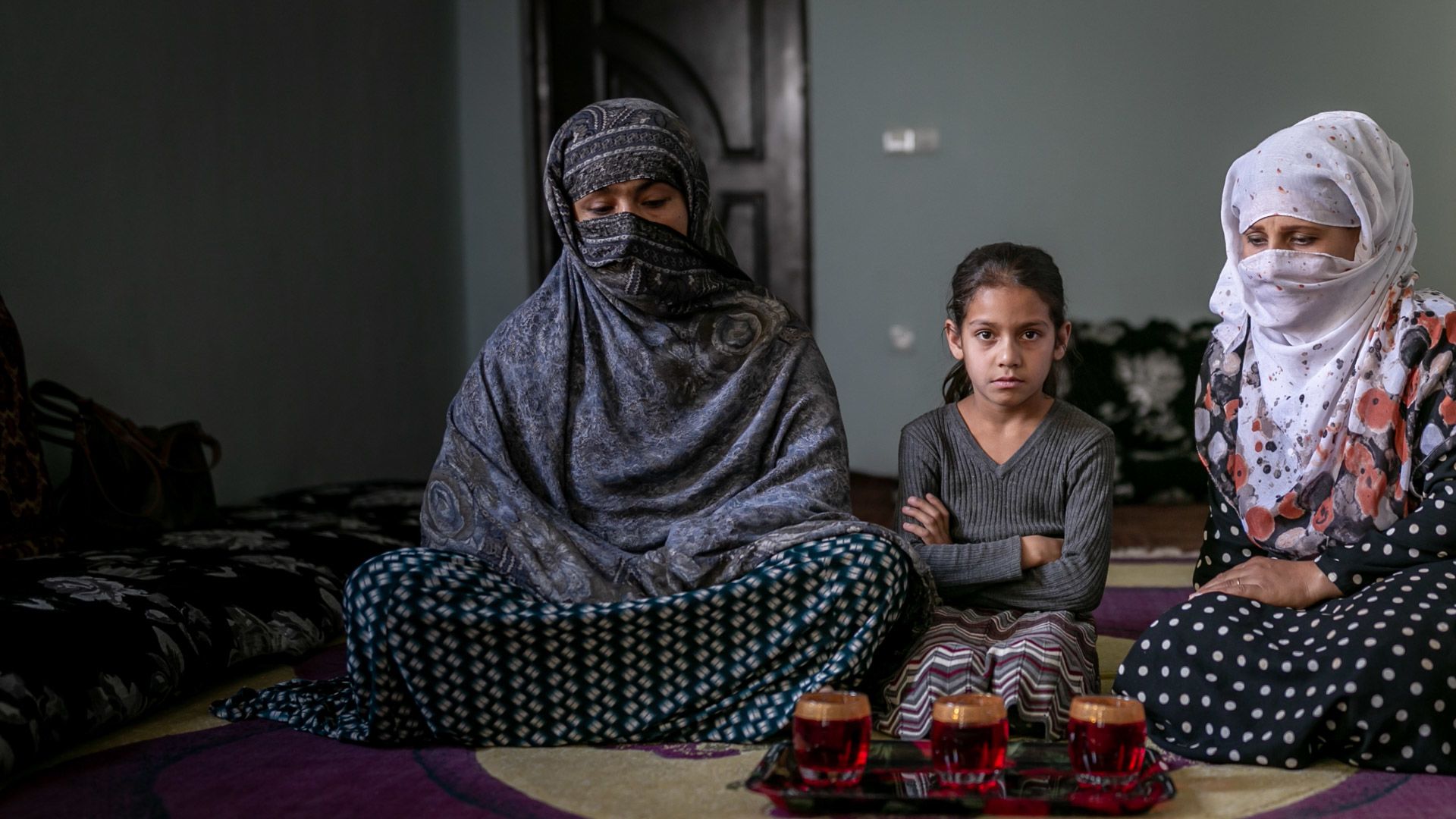
Decades of war have left many ordinary civilians feeling paralysed, and those wielding the least power and facing the most insecurity are women and children.
For those women living in major government-controlled cities, life has changed dramatically since the days of Taliban rule. With the formation of an elected government, and Afghan and allied forces creating a relative level of security, more girls have gone to school, and more women have gone to work.
Under Taliban rule, girls’ access to education was almost zero.
Since then literacy has climbed to 37% of adolescent girls, although this is still one of the lowest rates in the world.
However, for those living in the Taliban-controlled areas, women’s freedom to access education and work remains limited, and many fear if the group were to gain more power, their freedoms would be further curtailed.
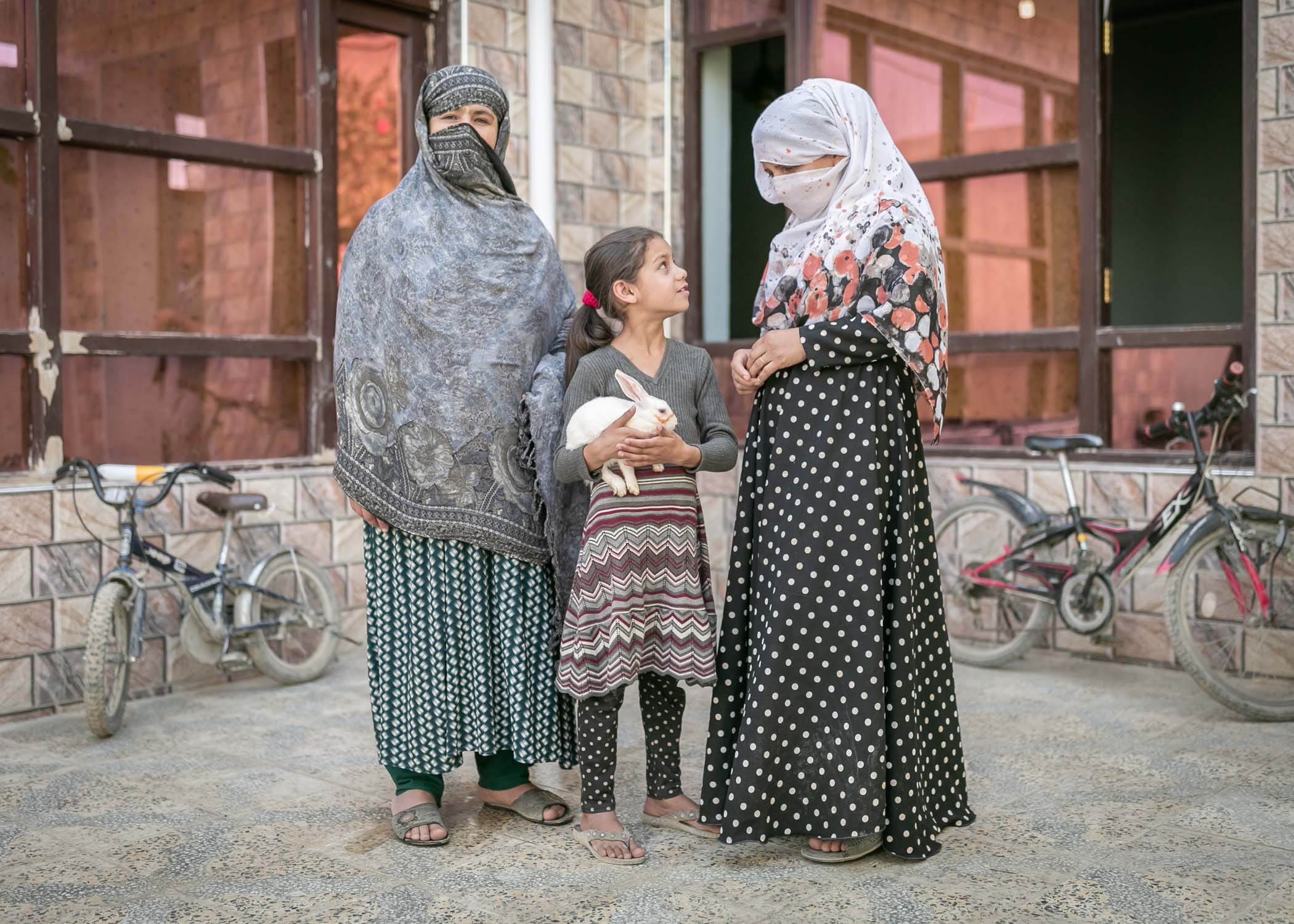
Sola (C) with her mother Nargis (R)
Sola (C) with her mother Nargis (R)
“Women will lose out of course,” says Nargis, a 30-year-old teacher and mother of six who lives in the north of Kabul.
“They won’t be allowed to be educated, or go to work - we will lose the most.”
The Taliban have stated that they are now committed to women’s rights, but many critics are sceptical about how far the Taliban have transformed themselves.
Nargis is one of them.
“I doubt that the Taliban have changed. Because as they talk peace, explosions continue, killing our Muslim brothers and mothers. What change is that?”
Nargis says the arrival of the Taliban and the subsequent unrest is the reason she missed out on an education.
“I was in class four of school when the Taliban came. Fighting began and schools were closed down. Girls weren’t allowed to leave their house. I was only nine or 10 when I took to the scarf [was forced to wear the hijab] and sat at home, never leaving it out of fear. We then migrated to Pakistan - school was left behind. After returning home, now I realise I’m missing a lot.”
She is adamant that her youngest daughter, eight-year-old Sola who is currently in school, will not suffer the same fate.
What Sola has already been educated in is the violence of war - she recently witnessed the horror of a Taliban suicide bomber.
“I saw a bomb go off. I saw young people die,” she says. “I was really scared, I was crying; my mum held on to me, put me in a taxi and brought us home.”
As the daily violence continues unabated across Afghanistan, peace talks seem to be the country’s only hope for change. However, getting first the US and Taliban around the table, and then including the Afghan government in the talks, seems a tough order.
The Afghan government say they will only meet the Taliban if a month-long ceasefire is agreed by all sides. In response the Taliban have said they will only sit down with the government after the full withdrawal of all foreign troops from the country.
So it is perhaps unsurprising that civilians like Nargis are sceptical of any lasting change in the country.
“I don't think peace will come. Afghanistan has become a cloth which everyone pulls in a different direction. It’s difficult to distinguish who is a friend and who is a foe,” she says.
“Whether it's the Americans, the Taliban or the government that takes over - our demand is just peace.”
Some names have been changed.

Decades of war have left many ordinary civilians feeling paralysed, and those wielding the least power and facing the most insecurity are women and children.
For those women living in major government-controlled cities, life has changed dramatically since the days of Taliban rule. With the formation of an elected government and Afghan and allied forces creating a relative level of security, more girls have gone to school, and more women have gone to work.
Under Taliban rule, girls’ access to education was almost zero.
Since then literacy has climbed to 37% of adolescent girls, although this is still one of the lowest rates in the world.
However, for those living in the Taliban-controlled areas, women’s freedom to access education and work remains limited, and many fear if the group were to gain more power, their freedoms would be further curtailed.

Sola (centre) with her mother Nargis (right)
Sola (centre) with her mother Nargis (right)
“Women will lose out of course,” says Nargis, a 30-year-old teacher and mother of six who lives in the north of Kabul.
“They won’t be allowed to be educated, or go to work - we will lose the most.”
The Taliban have stated that they are now committed to women’s rights, but many critics are sceptical about how far the Taliban have transformed themselves.
Nargis is one of them.
“I doubt that the Taliban have changed. Because as they talk peace, explosions continue, killing our Muslim brothers and mothers. What change is that?”
Nargis says the arrival of the Taliban and the subsequent unrest is the reason she missed out on an education.
“I was in class four of school when the Taliban came. Fighting began and schools were closed down. Girls weren’t allowed to leave their house. I was only nine or 10 when I took to the scarf [was forced to wear the hijab] and sat at home, never leaving it out of fear. We then migrated to Pakistan - school was left behind. After returning home, now I realise I’m missing a lot.”
She is adamant that her youngest daughter, eight-year-old Sola who is currently in school, will not suffer the same fate.
What Sola has already been educated in is the violence of war - she recently witnessed the horror of a Taliban suicide bomber.
“I saw a bomb go off. I saw young people die,” she says. “I was really scared, I was crying; my mum held on to me, put me in a taxi and brought us home.”
As the daily violence continues unabated across Afghanistan, peace talks seem to be the country’s only hope for change. However, getting first the US and Taliban around the table, and then including the Afghan government in the talks, seems a tough order.
The Afghan government say they will only meet the Taliban if a month-long ceasefire is agreed by all sides. In response the Taliban have said they will only sit down with the government after the full withdrawal of all foreign troops from the country.
So it is perhaps unsurprising that civilians like Nargis are sceptical of any lasting change in the country.
“I don't think peace will come. Afghanistan has become a cloth which everyone pulls in a different direction. It’s difficult to distinguish who is a friend and who is a foe,” she says.
“Whether it's the Americans, the Taliban or the government that takes over - our demand is just peace.”
Some names have been changed.


Credits
Authors: Auliya Atrafi and Claire Press
Additional reporting: Ibrahim Safi, Zabihullah Rahimzai, Najib Pasoon, Zuhal Ahad, Zamzama Niazi
Producer: Claire Press
Photography: Ed Ram, Auliya Atrafi, Ibrahim Safi, Claire Press, Derrick Evans
Editor: Sarah Buckley
Published: November 2019

Credits
Authors: Auliya Atrafi and Claire Press
Additional reporting: Ibrahim Safi, Zabihullah Rahimzai, Najib Pasoon, Zuhal Ahad, Zamzama Niazi
Producer: Claire Press
Photography: Ed Ram, Auliya Atrafi, Ibrahim Safi, Claire Press, Derrick Evans
Editor: Sarah Buckley
Published: November 2019
